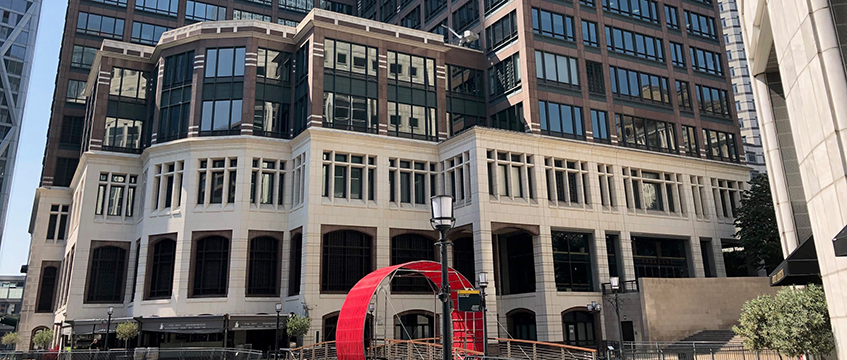Total UK commercial investment volumes reached £6.5bn in the third quarter, Lambert Smith Hampton has reported.
This was 50% below the five-year quarterly trend level, but 48% up on the second quarter of 2020, which was marred by the country-wide lockdown following the outbreak of Covid-19.
The third quarter was boosted by a few large transactions, including Link REIT’s £380m purchase of 25 Cabot Square, E14 (pictured), from Hines and Tristan Capital Partners’ £120m acquisition of Reading International Business Park. These deals meant the office sector accounted for 31% of the quarter’s investment volume, LSH said.
Even so, the industrial sector performed better hitting £1.6bn, which was only 19% below the five year quarterly average. It was buoyed by demand for distribution warehouses, which was 13% up on the five-year quarterly average, with transactions totalling £943m.
Retail for a fourth successive quarter saw volumes of under £1bn with £879m transacted in Q3, while the living sector was 59% below average with £1.4bn of deals done.
Within the living sector, the build-to-rent sub sector remained strong and accounted for half of the investment into the living sector in Q3. The largest deal in the quarter was Get Living’s £252m forward-funding of a 649-unit scheme in Lewisham.
LSH also reported that the all-property average transaction yield moved out by 46bps in Q3 to 5.71%. This was driven by the retail sector where the average transaction yield moved out by 159bps to 6.6%
Ezra Nahome, chief executive of Lambert Smith Hampton, said: “Encouraging as it was, the pick-up in investment naturally reflected the reopening of the economy and a partial return to a more normal way of life over the summer. But the asymmetry of Q3’s rebound, between sectors and UK regions, speaks volumes for the ongoing challenges stemming from the pandemic.
“The pandemic has pulled the rug from underneath the central London office market. The sharp increase in tenant space and evidence of unsold stock on the market has suddenly brought into question the global allure of the sector. The pandemic is prompting a shift in investor perceptions of ‘safe havens’, putting ever more focus on long income, secure assets over and above location.
“Increasing concerns over a second wave of infections and the newly announced system of restrictions will temper our initial expectations for a strong final quarter. That said, a cocktail of a global weight of money and increasing levels of distress is expected to stimulate significant activity in the market, if not in Q4, then certainly in Q1 2021.
“We are in choppy waters now, but for many investors this is a tremendous opportunity to hit the reset button and guide the transformation of the built environment firmly into 21st century. Current reforms to the UK planning system will have a key role to play, enabling the repurposing of retail and office assets for residential and other uses.”
To send feedback, e-mail louise.dransfield@egi.co.uk or tweet @DransfieldL or @estatesgazette











